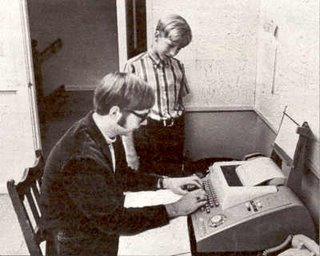PHOTO: Thomas Kraemer's visa paperwork, from the late 1980's, handwritten by Beijing, China officials during one of his visits to the Hewlett-Packard China research laboratory, which he founded at the personal request of the HP company cofounder Dave Packard who had previously served as the Assistant Defense Secretary under President Nixon and who was one of the businessmen that helped Nixon open up Communist China for trade with America. HP was one of the first America companies to do more than just exploit the low cost of labor for manufacturing in China. The research lab I set up initially employed researchers, many with Ph.D. degrees from American universities, who were paid the equivalent of $30 per month, which was the prevailing wages in China at the time, but when I mentioned these low wages to Dave Packard during a business plan review as being important to making a profit, he admonished me and reminded me that the reason HP was in China was not to exploit the low wages, but because he sincerely wanted HP to be a global business with an equal proportion of business, including manufacturing and R&D labs, in all countries. I still admire Bill Hewlett and Dave Packard's business ethics and I am not surprised that their company has survived so profitably and long after their deaths because of the ethics they instilled in the fabric of HP.
I was reminded of my time in China when I read the recent article by Christina Larson, "Technology: The Startup Winning Over China's Gays," BusinessWeek, Dec. 29, 2014 - Jan. 1, 2015, p. 31-33 posted online as "Technology: World's Largest Gay Dating App, Born in China, Now Attracts Global Investors," Dec. 10. 2014:
Ma Baoli worked as a cop in China's northern Hebei province for almost 20 years, until his colleagues heard about the gay online discussion forum he moderated in his spare time. Some of his work buddies "turned a cold shoulder" when they learned he was gay, Ma says. The police department forced him to make a choice: He could keep his job or keep running Danlan. org, one of the country's first gay-focused websites. When he abruptly resigned in March 2012, his confused parents showed up at the police station in search of answers: Ma hadn't come out to them.
The People's Republic has been slow to accept homosexuality. Consensual sex between two men or two women has been legal only since 1997. Until 2001, China's Ministry of Health classified homosexuality as a psychiatric disorder.
Gay dating apps Grindr, which originated in the U.S., and Jack'd, of Belgium, have signed up users in China, but they haven't kept pace with Blued. According to Ma, Blued has 15 million users, mostly in China, making it the world leader. (Grindr has about 10 million globally.)
. . .
China's smartphone revolution was in its infancy. Many Chinese without regular access to desktops or laptops were suddenly going online, and even longtime Web surfers found new possibilities in the privacy offered by handheld mobile devices. One 30-year-old civil servant in Beijing, who asked that his name not be printed because he isn't out to colleagues, says that he met his partner of 18 months on Blued: "When I was in my early 20s, I often went to gay bars to meet men. But now that I am a little older, I am more serious about my relationships." He says he likes Blued's timeline feature, where users can post daily messages and photos, because it provides a glimpse of the personalities of men he might meet.
Profiles on Blued include information on age, height, preferred sexual positions, and blood type (which is associated with compatibility in China), though most users use pseudonyms. The app has a geolocation feature that calculates the distance between two users' locations.
. . .
Ma says that after a year of agonizing over the direction of his life, he's "now much more at peace." He draws inspiration from Apple's (AAPL) Tim Cook. "As a successful CEO, he is changing the public's view of gay men in business," Ma says. Asked if he thinks China will ever legalize gay marriage, Ma says: "Definitely. It's a matter of time. Social change happens slowly."
I have been pleased watching the world open up to social justice and go from gay liberation activists of the early 1970's angrily criticizing Jack Baker's gay marriage activism as being contrary to the goals of sexual freedom and gay liberation, to a world with legal marriage in many places and an oppressive Communist state opening up to the idea of gay marriage, as well to see a gay CEO of Apple Computer Tim Cook. Likewise, it is heartening to see the work of American's work to remove homosexuality from the official American list of mental disorders be accepted internationally.










